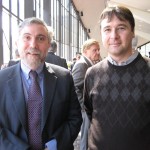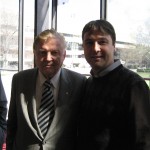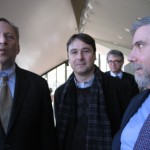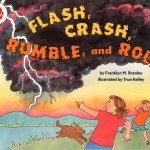Readers & Thinkers: The Paul Samuelson Memorial
Posted by ludw1086 on Aug 6, 2013 in Anything Goes | Comments Off on Readers & Thinkers: The Paul Samuelson Memorial
Dear All-
This past weekend, I flew to Boston to go to Paul Samuelson’s memorial. Here is a brief summary of the events.
First, there were lots of cool characters there, like Solow, Larry Summers, Paul Krugman, Jim Poterba, Larry Samuelson, Ed Phelps, Stan Fischer, Ricardo Cabellero, Amarta Sen, Olivier Blanchard, Robert Merton, Richard Zeckhauser, Stephen Ross, Greg Mankiw, Robert Mundell, and a few others.
From some of the conversations and speeches I learned more about discovery and progress and about the great Paul Samuelson.
Larry Summers told some funny stories. He talked about how once as a young man driving with Samuelson, the radio announced that “The Dow Jones had gone up.” Larry said “That’s great.” To which Samuelson replied, “So tell me Larry, does that mean you’re going to buy more shares in the future or less shares in your portfolio?” Larry became quiet.
He also told a story about how once Larry said something really stupid about economics. It was a week before Samuelson would give a eulogy for Okun. So Samuelson said to Larry, “Do you know what I’m saying in the eulogy for Okun? I’m going to say that in my entire time of knowing him, I never remember him saying something stupid. Well, now I won’t ever be able to say that about you.”
Ricardo Caballero told a story about the MIT faculty lunch. When the movie “A Beautiful Mind” came out, everyone in the faculty club was talking about how brilliant Nash was. Samuelson stood up and said “He wasn’t the most intelligent guy. In those days, it was actually Alberto Calderon (the mathematician related to many important results in partial differential equations that visited MIT from 1955-1959).”
Bob Solow told some funny stories. Larry Summers was notorious for being late to everything. One time two students were waiting for him and one of the students said to the other, “I heard he’s the son of God.” The other student replied, “No, he’s just the nephew.”
Bob also talked about how Samuelson was so generous and careful to cite everyone who had even touched the subject before him. Something we don’t see today quite often. He would also question his audience. In his first days at MIT, he would turn to other faculty and say “Do you know the answer to that? Do you?” None of them usually did.
Jim Poterba reminded us how hard the initial days were for Samuelson and MIT. When Samuelson joined MIT, it was hardly an economics powerhouse. There were just four professors, none of whom we would know by name. His attempt to bring mathematics to economics was not easy. Poterba read an editor’s reply to one of his submissions to the AEA. The letter said something like “Your paper adds practically nothing to the economic literature….you should use your talent to write something relevant for economics…” That paper was eventually accepted at another journal and is now the well-known Samuelson-Stolper theorem. When he tried to publish Foundations of Economic Analysis, there was objection from certain people at MIT. In one letter someone high up in the administration of MIT wrote something like “Under adequate supervision, this Samuelson might learn to do economics appropriately…” President Compton supported him and said the only reason we are lucky enough to have Samuelson is due to his loyalty to MIT.
One of the funniest stories I heard was that even Paul had to deal with silly referees. In one of his famous papers (the overlapping generations paper), he had a peculiar footnote (footnote #9, page 475), it read:
Before answering these questions, it would be well to decide what the word “surely” in the previous sentence means. Surely, no sentence beginning with the word “surely” can validly contain a ques-tion mark at its end? However, one paradox is enough for one article, and I shall stick to my economist’s last.
This was his adjustment to some silly referee comment. Everyone has had to deal with shed referees. 😉
Samuelson also never had to pretend. In another story, he was giving a seminar about diminishing marginal returns. One of the professors in the seminar (trying to show intelligence) said “Do you mean Pigovian marginal returns or Shovian marginal returns?” Samuelson just stared at the guy and replied “I mean good old marginal returns.”
Franco Modigliani summed it up best in 1983 when there was a dinner honoring Samuelson. He simply walked over to Samuelson and said “You’ve enriched our lives.”
Overall, it was a great weekend and I enjoyed chatting with some old friends. I’ve attached that beautiful 1958 paper for your own digestion (samuelson_overlapping) as well as a couple of photos that were taken with Nobel Prize winner Paul Krugman, Larry Summers, and Nobel Prize winner Robert Mundell.
Ludwig









